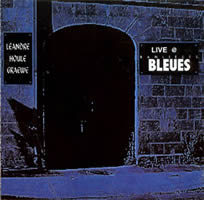The Red Toucan Story, then and now
|
[Normally, we don’t post contributions that resemble press releases. However, when quality labels deserve attention, we try to do what we can to assist. A two-part sampler, Amalgam(e) One and Two, provides an excellent picture of Michel Passaretti’s interests and tastes. Jazz aficionados especially ought to take note: http://www3.sympatico.ca/cactus.red/toucan/ Ed.] Michel Passaretti [June 2004.] Some ten years ago, a couple of music enthusiasts — I was one of them — regretted that our best jazz musicians in Québec had yet to be documented on recording. Could this neglect be due to indifference or, more pointedly, to the lack of a homegrown record label willing to do the work? The answer seemed obvious, so we decided to go for it right then and there. In our first year of existence, we brought out debut recordings of Québec’s Charles Papasoff and Normand Guilbeault. We soon decided to broaden our scope, both in area and style, after having been introduced to clarinetist François Houle, a native Montrealer residing in Vancouver. We wanted to present a different kind of music, one that listeners may not be so familiar with, or whose style may even appear remote from jazz. This new association with François was doubly important, for it enabled us, on the one hand, to produce a handful of titles that included artists of international standing (Marilyn Crispell, Joëlle Léandre, Georg Graewe and Hasse Poulsen) while gaining a foothold in the clarinetist’s adopted city, one brimming with highly original, improvising musicians who deserve greater recognition. Thus came about our two albums by Talking Pictures (Ron Samworth, Peggy Lee, Bill Clarke and Dylan van der Schyff), one of many fine examples of that scene’s musical dynamic. Our next recording turned out to be something of a coup for us, since it happened to be one of the last (and best) from the late Bay Area tenorman Glenn Spearman. Though the label was starting to roll, it came to a crossroads of sorts, a 16-month silence during which we started asking ourselves where we wanted to go from there. The timeout proved beneficial. It strengthened our resolve to issue releases we believed not only relevant but essential to the careers of artists on the jazz scene’s cutting edge, whose work might otherwise go undocumented. Our discoveries have been happy ones: the Andrew Drury Octet, the Frank Gratkowski Quartet, the duo of Michael Jeffrey Stevens and Mark Whitecage, the former Montrealer, pianist Dana Reason, the German pianist Achim Kaufmann, the South American composer and New York resident Laura Andel and, most recently, the Chicago double reedist Kyle Bruckmann. In our ten years of activity, 75 musicians have played on the Red Toucan label, new faces I’ve been proud to introduce and accomplished musicians like Peter Brötzmann, Gerry Hemingway, Baikida Carroll, Wolter Wierbos, Michael Moore and John Butcher. I can only be thankful for all the beautiful music they have provided. Finally, a word on our parent label, Cactus Records. Unlike the generally more volatile sides issued on Red Toucan, Cactus is geared towards special projects, music of a more composed nature. Here again, I am happy to have the chance to work with Dave Liebman and Michael Gerber, and present the music of Rhoda Averbach to the world. My fondest hope is for another ten years of musical discoveries! Michel Passaretti, Artistic Director [We asked Michel to be a little more specific on a couple of points. Here’s his addendum. Ed.] When I first started Red Toucan, my partner was Guy Chouinard. In the summer of 1998, we decided to close the label down because we diverged on what to do next. My partner had become frustrated with the fact that one doesn’t make much money selling improvised music. Then the following year, Rhoda Averbach approached me with her project with Dave Liebman and Michael Gerber. That convinced me to continue the adventure, and I formed a new company, Les Productions musicales Cactus. Souls and Masters was the first release on the new Cactus label. When I saw that my ex-partner didn’t want to get back into the music business, I decided to resuscitate the Red Toucan label. The two imprints are mine. I use Red Toucan for improvised music and Cactus for special projects. Voilà! [In 1997 Walt Mundkowsky wrote this review:]
[Léandre / Houle / Graewe: live @ Banlieues Bleues. Joëlle Léandre, bass; François Houle, clarinet; Georg Graewe, piano. Red Toucan RT 9306. Red Toucan is a Montreal jazz label that has recently acquired US distribution. This release, the sixth in the Open Fields series, is exceptional; if the others possess comparable quality, it’ll be a pleasure to encounter them. The clarinet-piano-bass combo creates fascinating problems — instruments so opposed that blend and balanced volume are difficult to achieve, as is the appearance of ensemble flow. These players — Canadian clarinetist François Houle, German pianist Georg Graewe, and French superstar bassist Joëlle Léandre — have virtuoso techniques and questing spirits. Three successive tracks lay out the stylistic range. Aizi is almost indecently gorgeous. Graewe opens with Bley-like turns of phrase and suspended harmonies; Houle blows a ravishing melody, supported by Léandre’s grandly bowed chords. A Parisian traffic jam follows in Démonique — Houle’s agitated honking and Léandre’s furiously sawed bass. Qalam wrests coherence from unrelated events: a squeaking bass string, heavily pedaled runs from the keyboard’s extremes, Léandre’s keening vocal, fluttering clarinet tones. Nobody should be discouraged by the “live” designation; sound this immediate and subtle would honor any studio session. The reverent audience doesn’t utter a peep until the closing applause — which for once seems entirely justified.] [More Michel Passaretti]
[Previous Article:
RetraCE We NeW E CarteR]
[Next Article:
Einstürzende Neubauten's Die Hamletmaschine]
|
